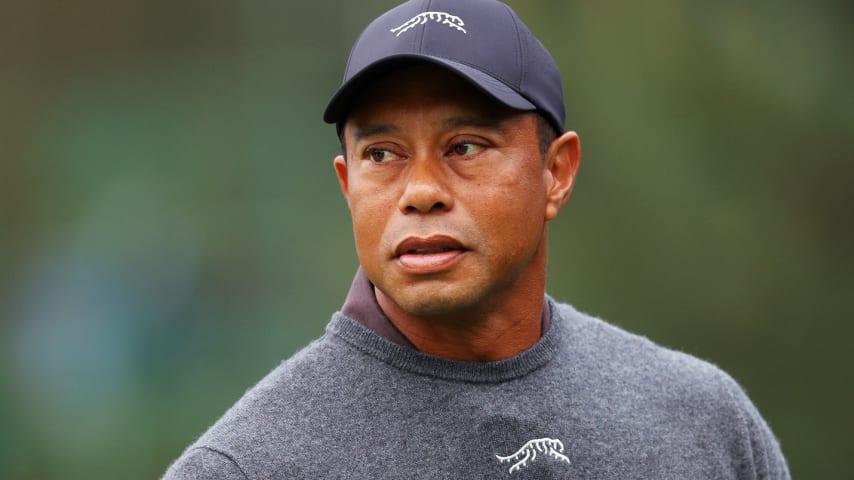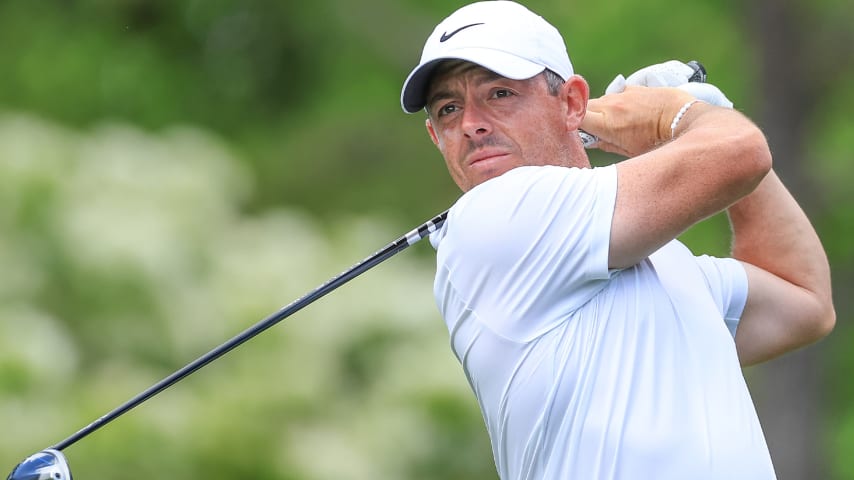Why this piece of conventional Masters wisdom could bite the dust
5 Min Read

One swing from every first timer in the 2024 Masters field
First-timers almost never win at Augusta, but this is an absurdly strong rookie class
Written by Cameron Morfit
First-timers almost never win at Augusta, but this is an absurdly strong rookie class
AUGUSTA, Ga. – It was just after 2 o’clock on Wednesday afternoon when Wyndham Clark got to the par-4 18th hole, playing alongside only his caddie, John Ellis. Clark teed his ball and produced his usual heavy hit, the tee shot leaking right and glancing off a tree but winding up in the fairway.
“One more,” he said, and Ellis flipped him a ball.
Clark walked to the right side of the tee. “And if there’s no wind, we’re (teeing it up) over here?”
Ellis said yes.
“I’ll practice a no-wind one,” Clark said. “Hit it right down Broadway.”
He split the fairway.
No Masters first-timer has won since Fuzzy Zoeller in 1979. Before that, a newbie hadn’t won since Gene Sarazen in 1935, the second Masters. But if there were ever a year to buck that trend, this is the year. Masters fields always have PGA TOUR and DP World Tour winners, Ryder Cup stars, the reigning U.S. Open champion, and multiple top-10 players in the Official World Golf Ranking, but this year’s 20-man rookie class boasts those accomplishments all by itself.
Clark, world No. 4 and the first reigning U.S. Open champion to make his Masters debut since Orville Moody in 1970, wasn’t the only one getting in late reps while the hit-and-giggle Par 3 Contest played out nearby. Patrick Cantlay and Xander Schauffele were just ahead of him, and Rory McIlroy was playing the front nine.
But the late grind by Clark, arguably the hottest player over the last 11 months, non-Scheffler division, spoke volumes. Clark is here to win, and it’s not crazy to think he could do it.
“Stats like that are meant to be broken,” he said of the rookies’ drought. “So, I know it's a tall task. It's a challenging golf course. … And I like my chances. I really like myself on this golf course. I feel good on a lot of tee shots and approaches, and there's so much creativity.”
Masters veterans will tell you about the importance of course knowledge and understanding where to miss. No doubt those things are important, but it’s something of a fluke that it’s been so long since a first-time player slipped on the green jacket. Consider the rookies’ close calls:
- Dan Pohl lost a playoff to Craig Stadler in 1982.
- Jason Day tied for second in 2011.
- Jordan Spieth and Jonas Blixt each tied for second in 2014.
- Sungjae Im tied for second in 2020; his 15-under total would have won most Masters.
- Will Zalatoris finished solo second, a shot behind Hideki Matsuyama, in 2021.
The best showing by a first-timer last year was by Sahith Theegala, who finished ninth. Then-amateur Sam Bennett (T16) contended for the first two rounds. Abraham Ancer was the last rookie to take or share the first-round lead in 2020, and Spieth was the last one to share the 54-hole lead in 2014. (He would win a year later.)
This year’s gathering of rookies, though, might be the strongest ever.
Ludvig Åberg was in college a year ago, but since then he’s won on the DP World Tour and PGA TOUR and starred for Europe in the Ryder Cup in Rome. He’s ranked ninth in the world.
“I guess all I'm trying to do is just embrace all the nerves and all the excitement that I feel,” Åberg said, “and at the same time know my capabilities and know my qualities and know that that's probably going to be good enough to compete.”
Nicolai Højgaard, 23, won the DP World Tour Championship at the end of last year. It was his third victory on that circuit. He’s 38th in the world and also played in the Ryder Cup last fall.
Akshay Bhatia (Valero Texas Open) and Stephan Jaeger (Texas Children’s Houston Open) each won in his most recent start. Grayson Murray (Sony Open in Hawaii), Nick Dunlap (The American Express), Jake Knapp (Mexico Open at Vidanta) and Matthieu Pavon (Farmers Insurance Open) also notched surprising wins this year.
There’s something to be said for an absence of scar tissue. Collin Morikawa won the 2020 PGA Championship and 2021 Open Championship in his first look at both tournaments. That just hasn’t happened at the Masters, at least not for a while. Over the last 20 Masters, the winner was playing in the tournament for, on average, the ninth time. This has given rise to the flawed perception that the ball knows how many times you’ve played the tournament.
The best argument for a first-timer remains Clark, who had done nothing of note in THE PLAYERS Championship but came agonizingly close to forcing a playoff with Scottie Scheffler, his birdie putt at the last lipping out violently. It was a hiccup of physics. A glitch in the matrix. It was also Clark’s second runner-up finish in as many starts after also finishing second to Scheffler at the Arnold Palmer Invitational presented by Mastercard.
Clark’s 2024 season has also included a victory at the AT&T Pebble Beach Pro-Am, where he shot a course-record 60. He made two advance scouting trips to Augusta National, playing a total of 72 holes. He wanted to get the awe factor out of the way so that he could focus on his golf.
“I know I'm going to have the first tee jitters when I step up on one and put the ball on the peg and have to hit it,” he said. “But I'm really hoping that, when we get to Hole 2 or 3 or 4, I'm pretty relaxed and I just get about my business and do my job. … I mean, it’s golf. It’s putting a golf ball in the hole as fast as possible.”
And if that means slipping into a green jacket as fast as possible, so much the better.





